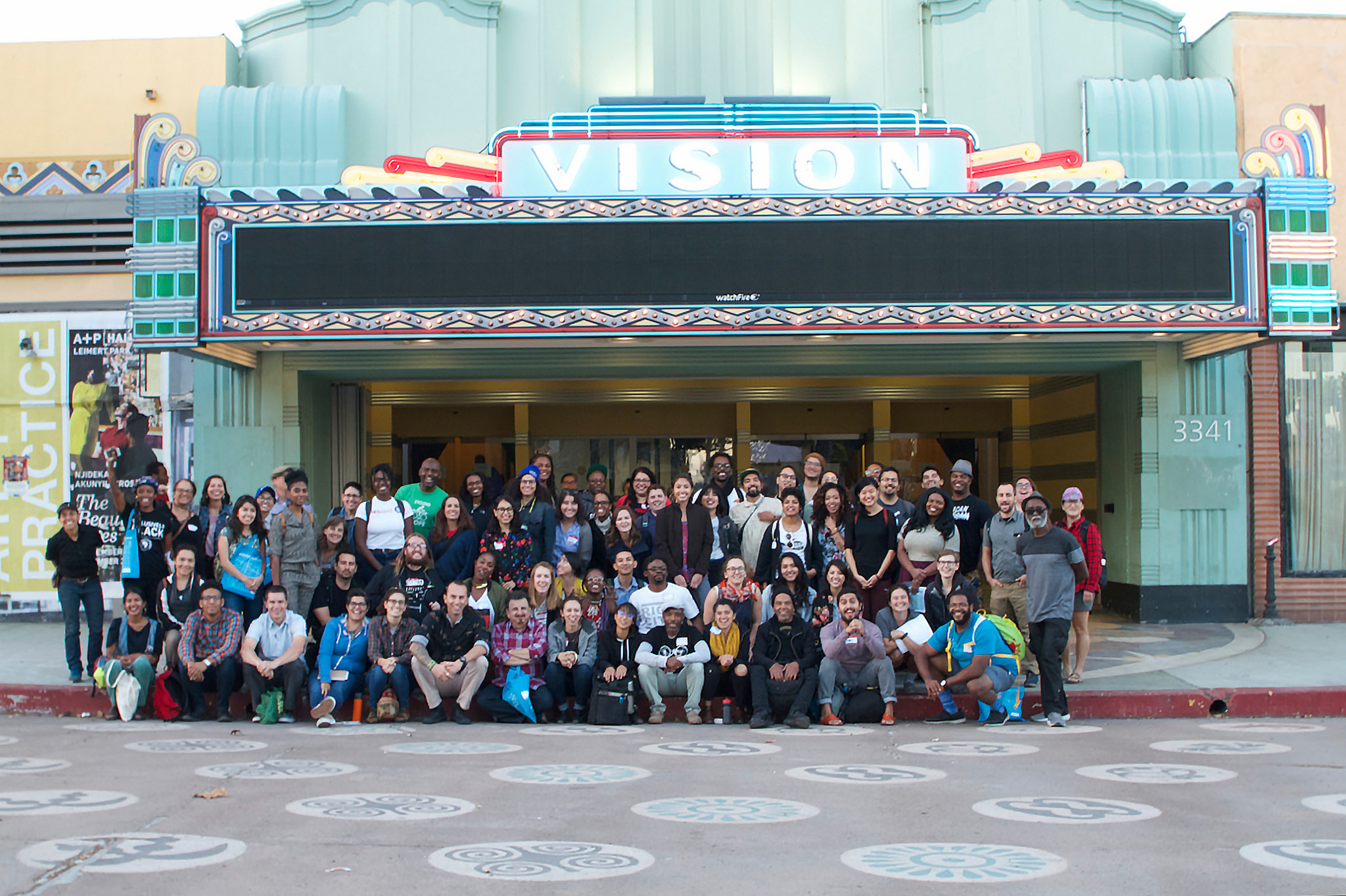“This is the most colorful room I’ve seen in a while,” proclaimed Dr. Adonia Lugo, co-organizer of Untokening California, a multiracial convening in Los Angeles focused on mobility justice, as she looked around the room the morning of Saturday, November 4. “This is only able to happen because of years of relationship-building.”
With a focus on centering "Black, Indigenous, People of Color, and others from marginalized groups," the Untokening sought to create a space for people to think about what it means to reclaim streets in terms of culture, class, identity, and community.
From the very beginning, Lugo saying that the representation in the room was possible because of years of genuine relationship-building already challenged the notion that merely having diverse faces in a room creates inclusive spaces. If the first time communities of color are being engaged is at a meeting, groups and organizations have failed.
When we genuinely engage communities of color, it brings greater complexity to the issues we face and allows us to come up with more holistic solutions. Sitting at a table that morning, I started hearing stories about the motivations of attendees for attending. Georgina Serrano of T.R.U.S.T. South LA told us of her work merging affordable housing and transportation advocacy, an intersection I see as crucial in order to approach community development in an equitable manner. It all boils down to helping residents have agency over their staying power in their communities and addressing factors that may serve as impediments to that.
Serrano spoke of the challenge of pedestrian and cyclist fatalities near her office in South LA. According to L.A.'s Vision Zero Safety Study 2017, sixteen of the twenty-five most dangerous neighborhoods for cyclists and pedestrians are in South L.A. One way Serrano's organization has addressed the unsafe traffic conditions is to host slow bike rides to calm traffic along the routes. Her story inspired us to think about the many roles something like cycling can play in promoting community safety and justice.
During the first panel discussion of the day, each panelist addressed some aspect of mobility justice through an equity lens, each adding another piece to the definition of equitable. The most valuable voices sometimes are the ones bringing up intersections we often neglect, and those bringing more nuance to our histories.
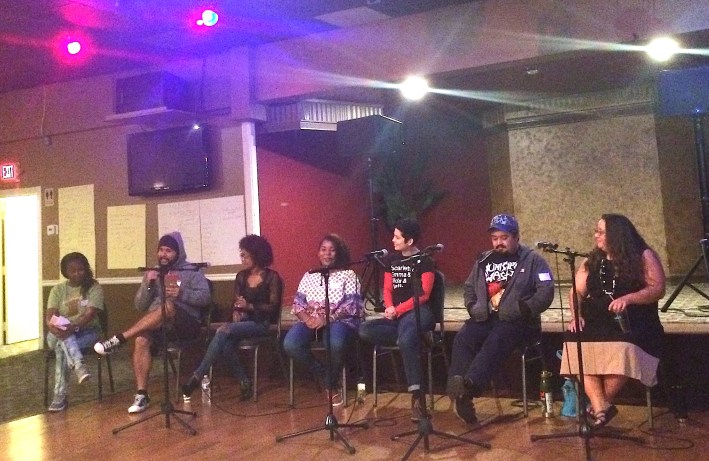
The first speaker was Angela Mooney D’Arcy, executive director of Sacred Places Institute for Indigenous Peoples. When we think of gentrification and displacement, we commonly think of it as a naturally occurring phenomenon, but Mooney D’Arcy pushed back on that. “The first gentrification was when Natives were removed and their land taken,” she said. She stressed the importance of centering Indigenous peoples in conversations around development, particularly when thinking about the bloody history of our land. “You can’t heal when the wound is still festering,” she emphasized. She suggests a new approach for marginalized communities to think about taking ownership of their neighborhoods. “Rather than decolonize, we need to reclaim and remake spaces.” This was a call to action for communities who are often at the receiving end of the remaking, rather than paving their own way, and often not by choice.
The next speaker was a perfect example of someone working to empower her community to be in control of decision-making. Alia Phelps of the Alliance of Californians for Community Empowerment (ACCE) was born and raised in Oakland, a city she’s seen experience “rapid change.” Her story demonstrates the power of engaging ordinary residents in fights for their communities.
Her story of involvement began when she was a mom sitting at a bus stop in Oakland. As she sat there, a man approached her and asked her questions about transit service. “Do buses come enough?” he asked. Those questions led her to get involved with the campaign for better transit, which included fighting against fare increases within the local transit district AC Transit and bringing bus shelters to bus stops in front of senior facilities.
For Phelps, the fight for transit is closely tied to the fight against gentrification. “When I was young, it was mostly people of color on the bus, now there’s a ton of white people,” she said. “There are two kinds of bus-riders: folks who have no choices and others who have a car but choose to ride.” Phelps says we need to be fighting for better transit, while simultaneously fighting against rent increases and evictions. We often see the fight for better transit far removed from issues like housing, but if transit access is improved without taking housing affordability into account, it can contribute to higher property values and housing costs, so that improvements become associated with displacement.
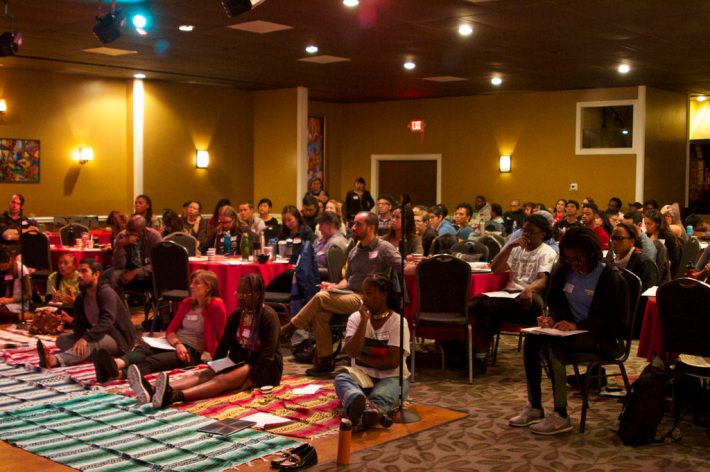
Kishi Hundley of T.R.U.S.T. South LA. told another story that built on the theme of displacement. Hundley was one of the most compelling speakers for me, partly because of how candid she was. Hundley spoke of her own story of fighting displacement from South Central and how T.R.U.S.T. South LA helped her win the right to return to her home once her building is reconstructed.
In addition to the challenges of maintaining stable housing, Hundley discussed the difficulty she has faced finding a stable job and how that intersects with transit justice. “I have a car and a bike, but sometimes I have no money for the car,” she said. “There isn’t a lot of employment out there.”
Hundley describes riding bikes for fun and as a lifestyle, but it goes deeper than that for her. “We sometimes don’t have a way to make ends meet, so we ride our bikes.” It was important to hear Hundley’s story because biking often gets stereotyped as a leisure activity for white people, but it can mean so much more than that to communities. For some people, cycling provides mobility when financial strains limits other options. When we consider biking in a broader sense, meaning a variety of things to different people, that may change our priorities in terms of biking infrastructure.
The final panelist to speak was mark! Lopez, executive director of East Yard Communities for Environmental Justice (EYCEJ), which works alongside residents of Southeast Los Angeles and Long Beach. Lopez first took a minute to acknowledge the uniqueness and importance of The Untokening convening. “Conversations about us happen without us often,” he said. “That is why this space is important.”
Lopez described how EYCEJ started with a basis on transportation issues. “60,000 trucks drive through our communities daily (a blogpost he wrote discusses this further),” he said. “It’s a dangerous place to be. Our neighborhoods are cut by freeways.”
Even though EYCEJ is located outside the city limits, its location in Los Angeles County means it is impacted by traffic in and out of the city. Given the challenges these communities face, Lopez expressed his disbelief about being continuously being left out of decision-making. “It’s a trip to be excluded from conversations when it affects us,” he said. “City of Los Angeles conversations happen without us.”
Lopez went onto describe what he sees as the meaning of mobility justice, which he sees as going far beyond bikes, buses, and trains. “It’s this idea of self-determination. So much has been enacted on our communities. We want folks to understand that what exists isn’t natural,” he said. “Once we understand these things are planned, we can make our own plans and change the trajectory of our neighborhoods.” Lopez emphasized that communities aren’t underresourced because of the innate lack of resources, but because resources have been stolen.
The panelist conversation gave way to a frutiful Q & A session. I was the first to ask a question, which I directed at Alia Phelps of ACCE. I was struck at how intersectional the fight for better transit was described in all the narratives I’d heard, a welcome departure from the narrowness in which its often portrayed. One of the questions I asked was, “How do you merge the fight for better transit and the struggle against gentrification?”
It all leads back to intersectionality, Phelps said. “Make sure campaigns aren’t working in silos,” she stressed, “Fight for our varying struggles.”
Mooney D’Arcy continued to drive home the point of being intentional of who we include in our struggles. “It’s important to include Native nations,” she said. “We aren’t doing enough for there to be entry points for Indigenous and Native people.” She also challenged how we often think of vacant land as representing nothing and being ours for development, but how is that connected to lost Native land? It is these historical points that can challenge us to reconsider how we take ownership over land without taking into account the peoples who once inhabited it. What can equitable development look like when we approach it through a historical lens?
This question of equitable development can often become even more complicated when we factor in all the players involved. Advocates of color often have to interact with government agencies or nonprofit organizations, which can often contribute to tokenization and ultimately stymie what they can do. It can ultimately lead to communities deciding to increase the outside pressure on institutions.
“We don’t want to sit in on a million meetings with you [government agencies and non-inclusive institutions] as you tell us what we need,” Phelps said. “This is why direct action is needed.”
Lopez echoed the sentiment and described what we need to be doing to hold elected officials accountable. “If you are a politican and you are f---ing up, I’m going to let you know,” he said. “The more comfortable we are calling our elected officials out, the less comfortable they’ll be f---ing us over.”
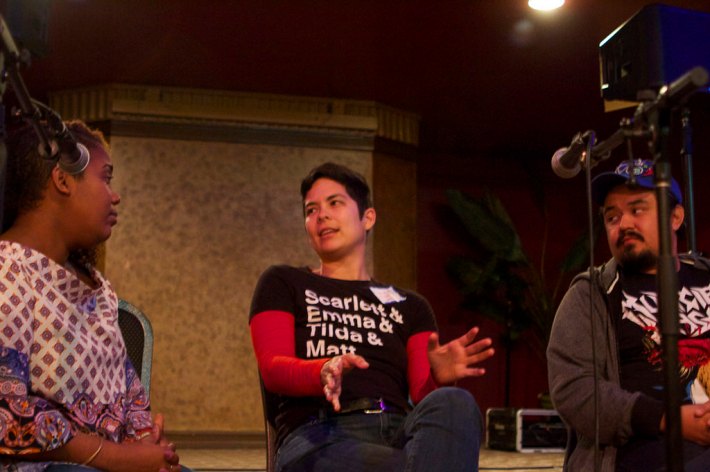
Allison Mannos of the Los Angeles Alliance for a New Economy also expressed that the lack of vision in bureacracy can potentially be an opportunity for us to be pushing our better ideas. “We can’t just be in a battle stance, we need to develop vision and proposals,” she said.
As the discussion wrapped up, it all led back to the idea of tokening and how we can move past that to essentially untokenize our movements. Part of that is being honest about how organizational structures and funding play a role in that.
Hundley spoke of her challenges seeking employment and how that relates to the question of untokening. “Our work is tokenized and we aren’t valued.” Audience members seemed particularly unnerved that Hundley was having trouble finding work, especially given her extensive work in her community. Mannos said, “We’ve got to avoid situations where people are exploited as volunteers.”
Mooney D’Arcy also expressed. “We’ve got to hold philanthropy and funders accountable. They’ll spend more money patting each other on the back than on the actual work.”
Along with funding streams, we need to consider how the very structure of organizations can contribute to the marginalization and tokenization of communities. Lopez described the unsettling nature of the corporatization of organizations, with boards and pay scales structured as such. “There’s levels to this nonprofit thing. It’s important to understand how organizations grow and question whether they are doing it in a just way,” he added.
EYCEJ seeks to create an environment in which the community has ownership and drives vision. No one can join the board of EYCEJ unless they’ve been involved for two years and everything at EYCEJ is initiated by its core membership. “At our org, our pay scale is flat,” he said. “Our interns get the same pay as everyone else. It’s easier to have accountability when everyone’s getting paid the same,” Lopez said. “Transformation isn’t just looking out, but looking in.”
It was important to end the panel on this idea of looking in. While we work to dismantle the oppressive structures that weigh down our communities from the outside, how do we also look internally to see how we replicate those very systems? As we consider this very question of how to build equitable communities, streets, and transit; we are confronted with difficult choices in regards to how we approach fighting for those resources. At the core of it is the question of how to do that in a just way.
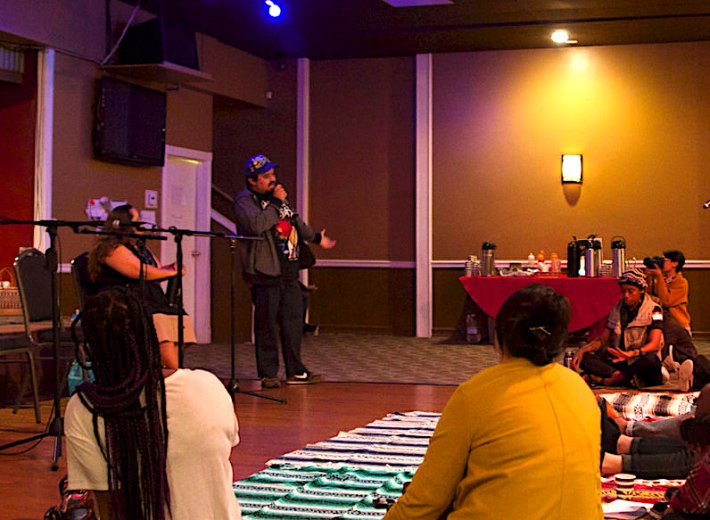
Looking inward is an essential part of our work, even more so when employees of organizations are attempting to do work in communities they don’t live in. Much of the conversations at The Untokening were based on wanting to push back on those outside organizations because they are often the ones perpetuating tokenization. It’s much harder to build in a place you’re not from and when your organization does not reflect the communities you seek to represent. Our movements require allies from all sides, but that requires introspection of all our roles. It means being more intentional, being willing to sacrifice expediency for the sake of genuine relationship-building, and being able to truly relinquish power when necessary. It means challenging notions of what it means to be a true partner with communities.
It’s difficult work, and none of us have clear answers. I would say we all walked away from this conversation with more questions. However, the revelation of new questions means we are getting somewhere because we are being critical and not settling for what’s easy, but rather challenging ourselves to refocus our lens.
The panel set a good foundation for what the rest of the day had in store, which continued to unravel the complex idea of what it means to truly reclaim streets for all.
Kishi Hundley brought this idea of reclamation home when she talked about wanting people to know she had a right to ride her bike on the street.
“We have a right to use our [bike] lanes; they’re not just your lanes. They’re our lanes.”
Thanks to Streetsblog L.A. communities editor Sahra Sulaiman for help with this post.
